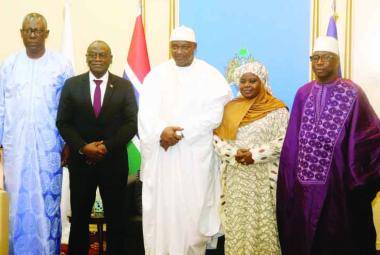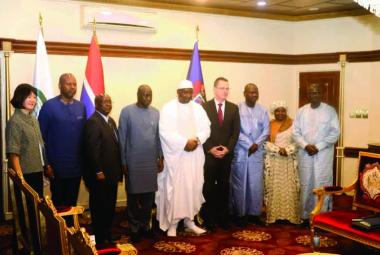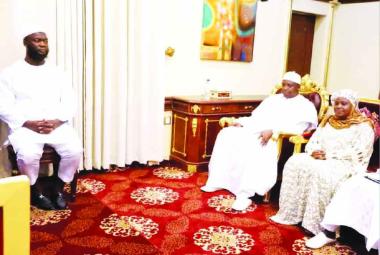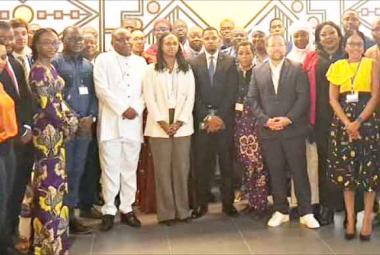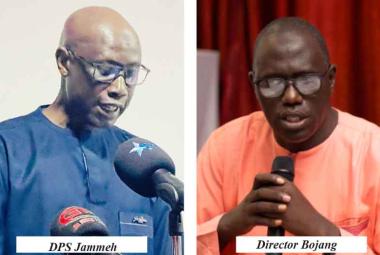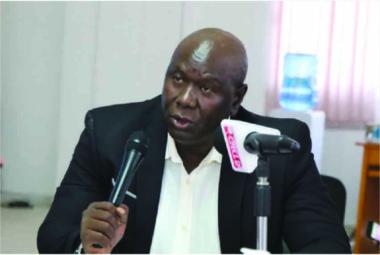By Sarjo M Camara
Mr. Yusufa J. Gomez, the Executive Director of Gambia Food and Nutrition Association (GAFNA), in this exclusive interview shares with Gambia Daily his agency’s role and its work around refugee communities in The Gambia.
G.Daily: Tell us a bit about GAFNA
The Gambia Food and Nutrition Association (GAFNA) is a national NGO that was established in 1986 and was legally registered in 1989 to operate in The Gambia. GAFNA’s existence was facilitated by the Catholic Relief Services (CRS).
GAFNA’s existence is also motivated by some nutrition specialists mainly from the Medical Research Council (MRC), CRS, some UN agencies and the Nutrition Unit of the Ministry of Health. In view of the nutritional challenges affecting the country at the time, these professionals did periodic review of the nutritional dynamics and the results published to guide programming and policy agendas of the country.
The decision to create GAFNA by CRS was to hand over the operations of a USAID-funded ‘Title Two’ nutrition project that used to support nutritional requirements for lactating or pregnant mothers and their children on a monthly basis. This project also facilitated the creation of 119 community management committees (CMCs) throughout The Gambia mainly from the nutrition project participants. Other health and development-related programmes that GAFNA used to implement were also supported by CRS.
G.Daily: How did you come to have anything to do with refugees?
It was in view of the experience that GAFNA has accumulated in the area of food commodity management with CRS that the UNHCR approached it for partnership arrangements. Consequently in 1998, GAFNA started partnering with the UNHCR in refugee programming, thus becoming the NGO Implementing Partner to UNHCR with the Liberian and Sierra Leonean refugees then, followed by the Casamance and other refugees and asylum seekers from other countries within and the sub-region and beyond to date.
G. Daily: What is the state of refugees in The Gambia?
Currently there are two different caseloads of refugees residing in The Gambia - urban and rural-based. The rural-based refugees and asylum seekers are close to 3000 and are mainly from the Southern Casamance region of Senegal. These refugees are protracted in nature in view of their long stay in The Gambia. The urban-based refugees constitute a little over 1000 and also constitute Senegalese and from other countries within the sub-region and beyond. Every year, UNHCR provides budgetary support to GAFNA to support these refugees and asylum seekers’ protection and other livelihood needs in The Gambia.
G. Daily: How do they become refugees in the country?
Asylum seekers who seek refugee status in The Gambia come to The Gambia in different ways. Asylum seekers fleeing their country of origin during conflicts and in numbers are processed normally at the border of entry by the relevant authorities; such as The Gambia Commission of Refugees (GCR), being the Government Implementing Partner to UNHCR in The Gambia, and other sister security and humanitarian agencies, before they are allowed to enter the country. This is followed by helping them to acquire the necessary documentation such as the Refugee Identity Cards and other related documents.
Individual and family asylum seekers fleeing their countries of origin for fear of persecution or other reasons are received by GCR and undergo a rigorous Refugee Status Determination, from which they are either granted refugee status or rejected for genuine reasons.
G. Daily: Is their refugee status perpetual or temporal and happens if their situations change?
UNHCR and its partners in The Gambia are pursuing the durable solutions strategy for refugees; especially for the protracted refugees. One option of the durable solutions strategies is voluntary repatriation when a country of origin for particular refugees is considered safe with a tripartite agreement by the host country, UNHCR, and the country of origin for this declaration to happen. So far refugees from Sierra Leone, Liberia and of recent Cote d’Ivoire underwent this process. In this case, UNHCR will take care of their repatriation expenses to enable them settle back smoothly in their countries of origin.
The second option is the possibility for them to locally integrate through in The Gambia through naturalisation to become Gambians, or they could continue to live in The Gambia as any other West African or migrant with the payment of residential permits.
The third option is resettlement to a third country; such as in Europe or Canada or other parts of the world for very vulnerable refugees or serious persecution issue in the country of origin.
G.Daily: Could you describe your support to refugees and asylum seekers
As mentioned earlier, GAFNA as the NGO implementing partner of UNHCR is responsible for providing livelihoods and other development needs to asylum seekers and refugees living in The Gambia.
During the emergency phase, GAFNA provides some basic accommodation facilities, livelihood assets related to agricultural ventures; such as donkeys, seeders, and sine hoes to enable continual farming; especially for those in the rural areas. This will ease the high dependency on their hosts
As stated above, refugees are assisted to enable them put up their own houses as they fully socially integrate in the communities since the abolishment of the camp system. Because most of the houses are located in the outskirt of the village, far from some social amenities, such as water and sanitary facilities, assistance is also provided in these areas.
Intervention in the areas of communal vegetable improvements (water and fencing) is done to create more space to enable refugees join their hosts carry out gardening activities.
Support for education for qualified refugee students to undertake university and tertiary education is provided with funding from UNHCR.
Vulnerability support is provided to refugees with very difficult background such as the elderly, sickly, disabilities, and newly arrived asylum seekers residing in the urban areas. Business or entrepreneurship support is given to those refugees with interest and passion in business.
Other forms of support accorded to refugees include support for apprenticeship for refugee youth, provision of working tools/kits for skilled refugees and support for vocational and skills enhancement. All the above support is to enable refugees and asylum seekers live a dignified life to pave way for smooth local integration in the Gambian society.
G. Daily: How do you supervise educational support and what has been the impact?
Since the shift in education support from paying school fees for all the refugee school-going children, GAFNA concentrates in giving support at the tertiary level. There is a scholarship package targeting qualified students for university education, called the DAFI programme. This programme is funded by the German Government through UNHCR. The other educational support targets refugees who opt for TVET.
These refugee students are supervised and evaluated regularly to ensure that they follow their courses of study and come out with good scores. So far, the DAFI programme has helped refugee youths to complete university education and now employed. Similarly, the TVET support has produced skilled refugee youths employed as masons, electricians, metal workers etc while some are self-employed.
The support provided has started yielding dividend because it has reduced the dependency for material support on UNHCR with some refugee households.
G.Daily: Can refugees in the country acquire citizenship?
The Refugee Act of 2008 in its current form has some gaps against ease of nationality for refugees in The Gambia. However, the GCR, being the Government partner to UNHC, and responsible for refugees’ management in The Gambia, is currently working rigorously to ensure that the legal reforms necessary are put in place.
G. Daily: What are some of your challenges in executing your functions as an agency?
GAFNA is currently depending on a sole donor for refugee programming. There is also donor fatigue and with the increase in instability globally, other needs are being prioritized; hence a decline in our funding envelope.
Apart from UNHCR, GAFNA receives some funding support from the American Embassy to supplement UNHCR funding to meeting funding and programmatic gaps.
Refugees residing in the urban areas are the ones really struggling in meeting their accommodation and livelihoods needs; unlike those residing in the rural areas who have more social capital than the ones in the urban areas.
G. Daily: What is your take on irregular migration and how does it relate to your work around refugees?
Migration is a generic phenomenon. People migrate either for social, economic, political or education to name a few.
Even in The Gambia you have the rural-urban migration syndrome.
Refugees are migrants to some extent but their purpose of being refugees is caused by either instability or fear of persecution from the countries of origin. Irregular migration is a very dangerous phenomenon because is affecting a lot of lives.
We also partner with other institutions to implement projects or activities. We have just also completed a project with NaNA for the 2022 floods that affected communities.
We are in serious talk with CRS to see how best we can support food security and other agricultural related activities in some of the refugee host communities.

